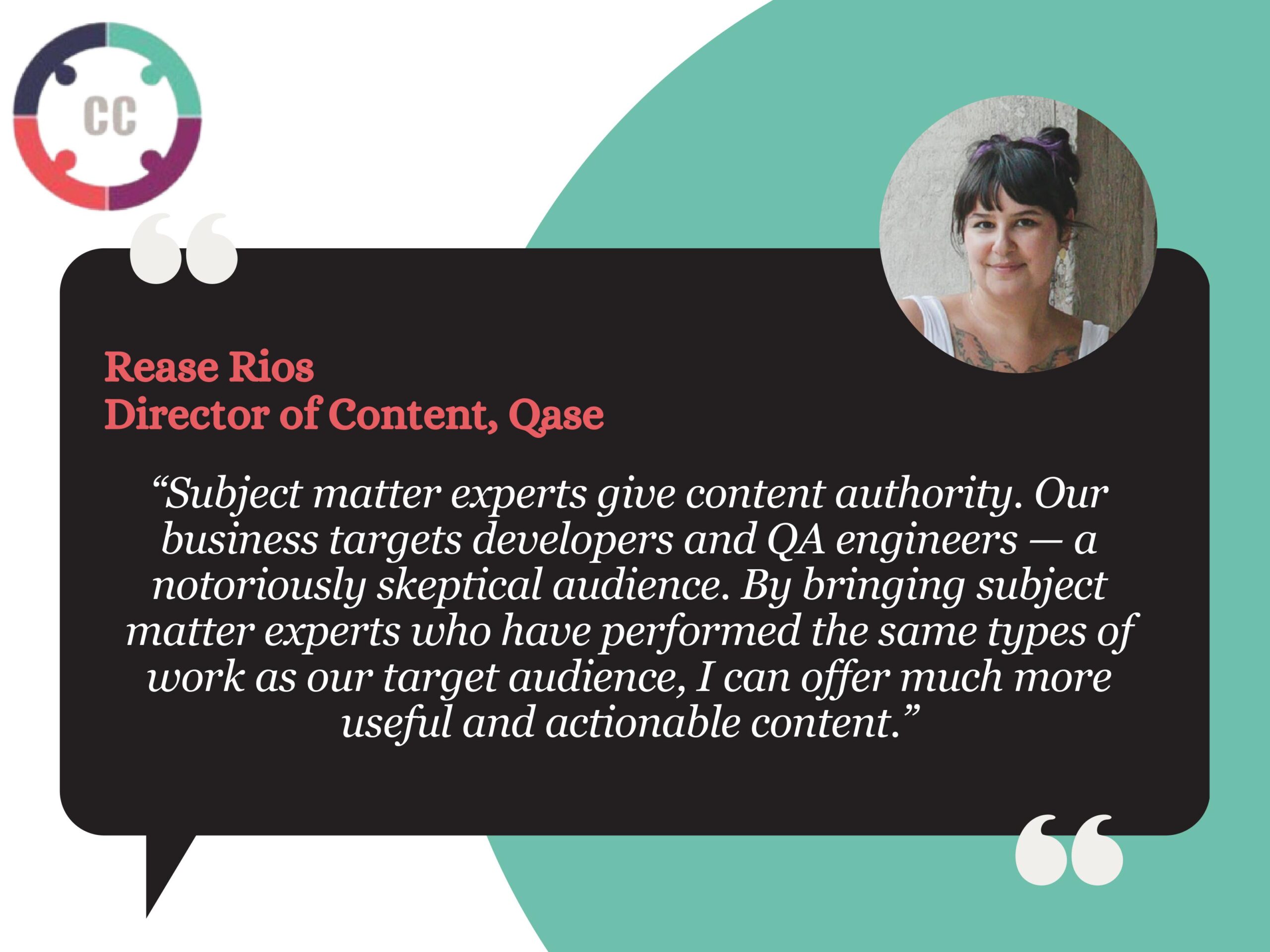Hold your horses!
Before you click ‘publish’ on your next blog post. Ask yourself: Why should readers trust what you’re sharing?
The internet is full of shallow content. Readers crave novelty, credibility, and content that reflects expertise and real-world experience.
It’s okay to admit you don’t have all the answers and old methods like keyword research are no longer enough.
Luckily, there’s a way out.
Consider including subject matter experts in your content creation process.
They provide unique insights and credibility to your blog.
In this article, we will discuss who a subject matter expert is, what your business can gain from including these experts in your content, and how to vet them to ensure a successful collaboration.
- Who is a subject matter expert?
- 6 benefits of collaborating with subject matter experts
- How to vet subject matter experts for four content
Who is a subject matter expert?
Subject matter experts (SMEs) have specialized knowledge and firsthand experience in specific topics.
Their insights and advice are valuable. They help content marketing teams on a mission to create high-quality, authoritative content that attracts and retains blog audiences.
SMEs help reduce errors and risks. They offer expert guidance in areas where other team members lack expertise.
6 benefits of collaborating with subject matter experts
Content marketing is vital for business success. As such, marketing teams must prioritize making valuable content.
Subject matter experts (SMEs) are key in improving content quality.
Below, we explore six more reasons why including SMEs in your content process is vital.
- Build authority and leadership through your content
- Establish credibility
- Gain market research insights
- Grow your client base
- Bridge gaps in knowledge
- SEO Benefits
1. Build authority and leadership through your content
When a business involves industry experts, it produces more informed and detailed content, i.e. content with real-life experiences and examples.
As Rimsha Khan, Senior Content Marketing Executive at Arthur Lawrence | Exceptional explains, “Involving subject matter experts in your content strategy boosts its authority, enhancing trust among your audience.
These experts bring depth and accuracy to topics, offering insights that resonate with readers. Their involvement can raise your brand’s standing. It shows you as a knowledgeable leader in your field, setting you apart from competitors. This approach enriches the content. It also fosters a loyal community around your brand.
Penny Warnock, Brand Content Specialist at Foleon, adds, “You get a finger on the pulse of industry trends and insights when you collaborate with subject matter experts. Your information is from a primary source, and you position your brand as a thought leader.”
Rease Rios, Director of Content at Qase agrees, “Subject matter experts give content authority. Our business targets developers and QA engineers — a notoriously skeptical audience. By bringing subject matter experts who have performed the same types of work as our target audience, I can offer much more useful and actionable content.”
2. Establish credibility
Working with SMEs is a great way to place your business as a thought leader. It also helps to make it a trustworthy source.
Gareth Kirkham, Content Manager at Office Friendly says, “I’m fortunate to regularly collaborate with colleagues who are well known for their wealth of individual experience and expertise.
Integrating their insights into our content, such as blogs has established our organization and our content as an authority, fostering trust with our audience whilst driving engagement and conversions.”
3. Gain market research insights
SMEs help explain the how, what, and why of industry trends. They can provide industry forecasts and data-backed opinions.
Kit Reaux, Content Marketing Manager at Scan 123 explains, “Our company starts product/market research with SMEs to inform and enhance our decision-making processes, ensuring that Marketing, Sales, Tech Ops, and Customer Success all benefit from a wealth of specialized insights.
This collaborative approach fosters a well-rounded perspective across all departments, effectively preventing the tunnel-vision effect that could lead to costly missteps. Working with SMEs ensures that your business decisions are well-informed and diverse in perspective.”
4. Grow your client base
Industry influencers usually have a wide audience and industry connections. Getting a recommendation from a trusted expert is almost as good as seeing them. It will help attract potential clients.
Maintaining strong relationships with experts is important. It is a key hack for growing your client base while scaling your publishing frequency.
Sara Emezi, Copy Manager at Regina International Film Festival & Awards, says, “In my last job, as a content marketing specialist at an event tech company, we featured some industry experts in our content. That opened doors to new networks of potential clients and partners.”
5. Bridge gaps in knowledge
Collaborating with SMEs helps employees build their knowledge and industry processes and trends.
Morgan K. (Goettge) Johnston of Oak Arbor Marketing says, “One of the biggest benefits of including a subject matter expert when creating content is knowing that the expert adds value that is outside of your realm of expertise.
When collaborating with subject matter experts, I’ve found that I can provide more value in my content because these experts cover topics that are outside of my wheelhouse.”
6. SEO benefits
SMEs have insider information about the industry they specialize in. They show what is trending. They also show what is about to trend. They show the language and keywords to use to attract clients. Keywords boost search rankings and make content accessible to clients.
SMEs can also help increase your business’s EEAT (Experience, Expertise, Authoritativeness, and Trustworthiness) score. According to Semrush, a high EEAT score can lead to improved user trust and conversion rate.
How to Vet Subject Matter Experts for Your Content
We’ve covered the benefits of including SMEs in content creation. Now, let’s dive into the vetting process.
Below are attributes to consider when vetting SMEs for your content:
- Relatability
- Experience
- Expertise
- Time availability
- Teacher’s mindset
- In-depth knowledge
1. Relatability
Choose SMEs whose stories and experiences align with the values of your business.
Rease Rios, Director of Content at Qase says, “Vetting subject matter experts is a little like doing a recruiter screen. You have to look at their work experience, writing samples, podcast appearances, etc. to determine if they’re a good fit.
The key is finding someone who your target audience would relate to and respect.”
2. Experience
Earlier, we discussed how SMEs contribute to establishing content authority and credibility. But, achieving this requires collaborating with experienced professionals. They have lots of knowledge. They also have a broad network of colleagues, clients, and sponsors.
How do you find these SMEs?
Sara Emezi, Copy Manager at Regina International Film Festival & Awards says, “Look for top voices in professional communities and assess their level of relevance to their industry and followers. Look up their profile and determine how their previous projects, job roles, events, etc connect to the overarching theme of your content.”
3. Expertise
By definition, an expert has the expertise to add value to a topic.
“The best way to decide if a professional should be in your content is to review their body of work. This includes blogs, webinars, or podcasts they have made or joined,” says Jim Young, Senior Marketing Manager at Twilio.
“Taking this step allows you to audit their expertise in a given subject firsthand and ascertain which expert is the right fit for your business or strategy,” Jim adds.
Christine Michel Carter, Content Director at Lexia, says, “To check SMEs, I review their qualifications, and past work, and ask peers for recommendations.” We interview them and check their history with audiences. This ensures they align with our content goals.
This approach guarantees the selection of SMEs who can contribute valuable insights and engage our audience.”
4. Time availability
This is especially true when using an internal expert. You must check that they can do this task and are available.
SMEs are busy with their job tasks. So, “Confirming their availability to meet your timeline ensures the collaboration runs smoothly.” says Kit Reaux, Content Marketing Manager at Scan 123
Set clear expectations for deliverables and meeting schedule/frequency. These talks should happen early. They avoid conflicts and delays.
5. Teacher’s Mindset
Unfortunately, having subject matter expertise doesn’t always mean the professional possesses teaching skills.
Vrinda Vardhan Content Marketing Manager at Kissflow suggests you “Look for professionals who can simplify complex ideas and match their style with your audience’s needs. Go for subject matter experts that are passionate about their field.”
6. In-depth Knowledge
Hire an expert who understands the topic. They can give detailed and accurate information that adds value to the content.
Through research, you can measure an expert’s experience and expertise. Choosing an expert with specialized knowledge adds an authoritative tone to your content. It draws in clients and builds brand loyalty.
Wrap Up
Experts are crucial at every stage of content creation. They help from idea generation to promotion. They offer valuable insights during the ideation phase. They draw on their industry expertise to find content that resonates with clients.
In the writing stage, they fact-check and share insights from their experiences. Also, experts can extend your content’s reach by sharing it with their network.
The need for experts varies by business type. But, the benefits are too big to ignore.



